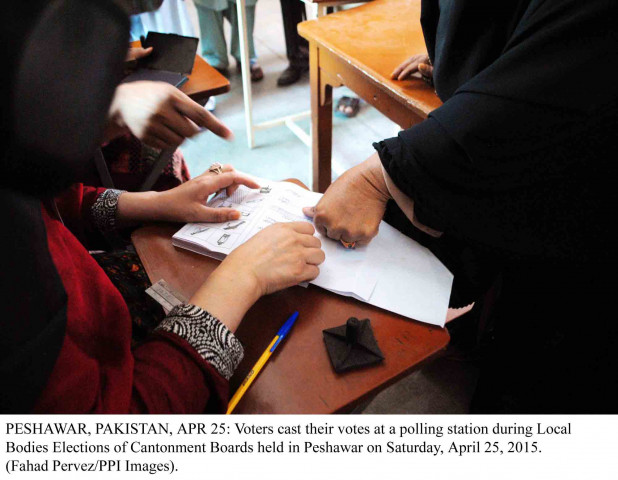Eliminating poll rigging
Being first of its kind in history of Pakistan, commission’s findings would hopefully strengthen democratic process

One would expect the political parties appearing before the commission to assist it in a positive way rather than play the spoiler simply to prove a point or disprove their opponents’ points. PHOTO: PPI
Being the first of its kind in the history of Pakistan, the commission’s findings hopefully would further strengthen the democratic process. Though its terms of reference appear to be restricted to finding out whether or not the previous elections were held strictly in accordance with the law of the land, whether they were rigged systematically and whether the mandate obtained through these elections was correct, the process of finding out the answers to these questions would surely identify the weaknesses and administrative gaps in the Election Commission of Pakistan’s (ECP) conduct of elections. These findings can then be made available in time for the parliamentary committee set up for electoral reforms to benefit from.
In order for the commission to finish its work in time and help it prepare a comprehensive report of any intrinsic value to the future conduct of elections in the country, one would expect the political parties appearing before the commission to assist it in a positive way rather than play the spoiler simply to prove a point or disprove their opponents’ points.
Pakistan has seen 10 general elections since 1970. Four of these were conducted by military regimes, three by set-ups supported by the establishment and three by civilian dispensations. But no matter who was calling shots at the time of elections, almost all have been tainted, flawed and carried the dubious distinction of being engineered.
Money flows like water during elections in Pakistan. Contesting elections has, indeed, become a rich man’s game. Spend a packet to buy a seat in the Upper or Lower House and pocket more than double the investment even before the tenure is half way through. At times the establishment itself has indulged in buying and selling tickets and seats. Though none of the culprits involved in the infamous case of the establishment distributing Rs140 million among the ticket-holders of the Islami Jamhoori Ittehad during the 1990 general polls has been made accountable for his/her misdemeanour, yet the infamy continues to dog the donors and the recipients — both identified in the court of law — of the tainted money.
More than anything else, it has been the failure of the ECP to play its constitutional role to hold free and fair elections that has consistently emboldened other institutions and agencies having no role in the process to interfere and influence the results. Under the Constitution, once an election schedule is announced, the ECP becomes powerful enough even to make the executive accountable for its deeds affecting the conduct of the elections. But the ECP has never been seen to have used these powers. Next, conducting an election demands administrative capacity of the highest order from the agency responsible for the job. However, since none of those who conduct elections — a retired Supreme Court judge holds the position of the chief election commissioner, his four provincial assistants are retired high court judges and the returning officers are also from lower judiciary — are trained administrators, the lower cadre civil servants, mostly those with a clerical mindset carry out the administration on behalf of the ECP and usually make a mess of things most of the time just because of their incompetence.
Hopefully, the political parties appearing before the commission would put forward their own suggestions like introducing the biometric system of identifying voters along with allowing the use of electronic voting machines to overcome these problems and reduce the chances of rigging to almost zero.
Published in The Express Tribune, May 3rd, 2015.
Like Opinion & Editorial on Facebook, follow @ETOpEd on Twitter to receive all updates on all our daily pieces.















COMMENTS
Comments are moderated and generally will be posted if they are on-topic and not abusive.
For more information, please see our Comments FAQ